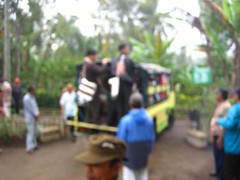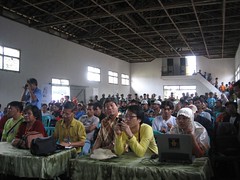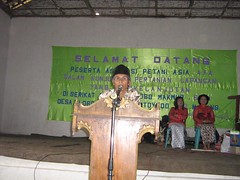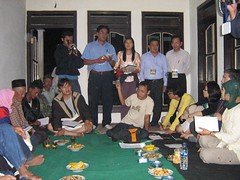 In order to learn more about the situation of Indonesian farmers, specifically their initiatives on SA, the participants to AFA’s seminar-workshop on sustainable agriculture went to Tlego Makmur, a farming village near Mt. Semeru, the highest mountain in East Java, last September 13, 2006.
In order to learn more about the situation of Indonesian farmers, specifically their initiatives on SA, the participants to AFA’s seminar-workshop on sustainable agriculture went to Tlego Makmur, a farming village near Mt. Semeru, the highest mountain in East Java, last September 13, 2006.
Riding on 2 pick up trucks, AFA farmer-leaders traveled around the 20-hectare area, stopping by to see an organic coffee plantation, the nilam (patchouli) oil extraction site, tapioka powder manufacturing plant, and the crops being planted in a 1,000-hectare reclaimed land.
The farmers stayed with host farmer- families for one night of sharing and dialogue about their respective situations.
 Farmer leaders and local officials of Tlego Makmur led the village ceremonies to welcome THE farmer leaders from 8 AFA member and partner organizations from 8 Asian countries. Around 300 people attended the ceremonies, which included a local art/cultural presentation by the local API union featuring the Madura and Arek sub-cultures, and a dialogue of life/discussion among the host and the visiting farmers.
Farmer leaders and local officials of Tlego Makmur led the village ceremonies to welcome THE farmer leaders from 8 AFA member and partner organizations from 8 Asian countries. Around 300 people attended the ceremonies, which included a local art/cultural presentation by the local API union featuring the Madura and Arek sub-cultures, and a dialogue of life/discussion among the host and the visiting farmers.
Tlego Makmur farmer representative Soetrisno welcomed everyone to the village and wished the participants a fruitful visit.
“What you will see here is the real condition of the farmers in Indonesia,†said Soetrisno.
 The village has 800 households or 5,000 people, with equal percentage of men and women. The main livelihood of the people is farming and the main crop is organic coffee, with inter-cropping of nilam (patchouli), cassava and snake fruit. Since the village is mountainous and not irrigated, farmers depend on rainfall.
The village has 800 households or 5,000 people, with equal percentage of men and women. The main livelihood of the people is farming and the main crop is organic coffee, with inter-cropping of nilam (patchouli), cassava and snake fruit. Since the village is mountainous and not irrigated, farmers depend on rainfall.
The village produces good quality organic coffee which is very famous since the Dutch colonial period. For the past five years, farmers from Brazil and Vietnam have visited the coffee farms to learn how to produce and process the coffee, which is number one in Indonesia.
PAKISAMA farmer leader Vicente Fabe lauded the initiative of API farmers in implementing  sustainable agriculture in their coffee plantations that do not use chemical fertilizers.
sustainable agriculture in their coffee plantations that do not use chemical fertilizers.
“I salute the whole group. I think you are very organized… I saw your reclaimed area. It is a very good example of how to fight to own the land. You are very organized so you were successful in reclaiming land,†said Fabe.
TWADA farmer leader Tai-Neng Chen, on the other hand, thanked the village farmers for the careful and dedicated preparation for the visit.
“I feel honored to be here… A lot of improvement is needed from the production to marketing of organic products. There is still a lot of problems in land reform, but God will bless you for the long struggle. I hope you will succeed,†said Chen.



Comments are closed